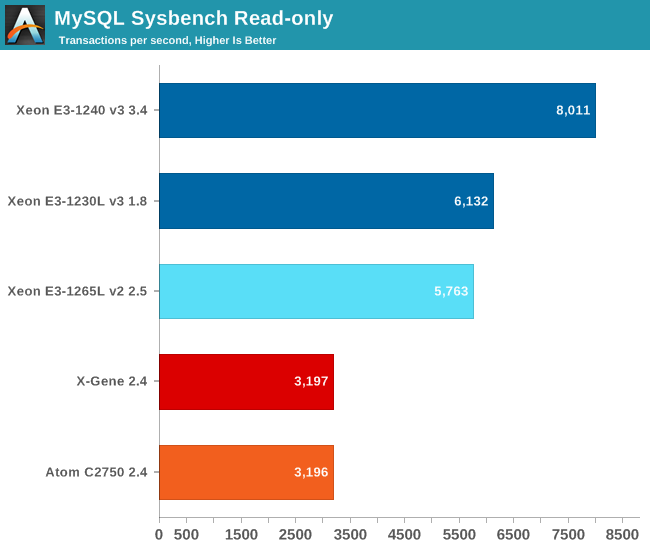X-Gene 1, Atom C2000 and Xeon E3: Exploring the Scale-Out Server World
by Johan De Gelas on March 9, 2015 2:00 PM ESTMySQL Performance
For testing real-world SQL server performance with our homemade stress-testing software (vApus), we need a powerful client with lots of bandwidth. That kind of client was not available to us inside the network where the HP Moonshot was located. So we went back to the MySQL Sysbench utility. Sysbench allows us to place an OLTP load on a MySQL test database, and you can chose the regular test or the read only test. We chose read only as even with a flash device, Sysbench is quickly disk I/O limited.
The main reason why we tested with Sysbench is to get a huge amount of queries that only select very small parts (a few or one row) of the tables, so we can see how the SoCs behave in this kind of scenario. Sysbench allows you to test with any number of threads you like, but there is no "think time" feature. That means all queries fire off as quickly as possible, so you cannot simulate "light" and "medium" loads.
The response times are very small, which is typical for an OLTP test. To take them into account, we are showing you the highest throughput at around 3 ms (2.8 ms to 3.3 ms). We tested with 10 million records and 100,000 requests

Again, the X-Gene is nowhere near the Xeon E3, but rather a competitor for the Atom C2750. The Xeon E3-1230L v3 outperforms the Xeon E3-1265L2 v2 by a small margin, despite the lower base clock.










47 Comments
View All Comments
JohanAnandtech - Tuesday, March 10, 2015 - link
Are you sure this is up to date? gcc tells me -march=native is not supported.JohanAnandtech - Tuesday, March 10, 2015 - link
Update. march=native does not work. I have tried -march=armv8-a but does not do much (it is probably the default). O3 makes the biggest difference. Omit it and you get 5.7 GB/s. With -O3, I am at 18 GB/s and more (stream m400)Alone-in-the-net - Tuesday, March 10, 2015 - link
Apologies. For AArch64 the only is "armv8-a", for intel, -march=native sets it to use the one for your CPU.https://gcc.gnu.org/onlinedocs/gcc-4.8.2/gcc/AArch...
https://gcc.gnu.org/onlinedocs/gcc-4.8.2/gcc/i386-...
From version 4.9.x and above of GCC, you can really start to add tuning for the CPU.
https://gcc.gnu.org/onlinedocs/gcc-4.9.2/gcc/AArch...
-mtune=name
Specify the name of the target processor for which GCC should tune the performance of the code. Permissible values for this option are: ‘generic’, ‘cortex-a53’, ‘cortex-a57’.
Additionally, this option can specify that GCC should tune the performance of the code for a big.LITTLE system. The only permissible value is ‘cortex-a57.cortex-a53’.
Where none of -mtune=, -mcpu= or -march= are specified, the code will be tuned to perform well across a range of target processors.
Alone-in-the-net - Tuesday, March 10, 2015 - link
Also support for the XGene1 as a compilation target is only from GCC5.https://gcc.gnu.org/gcc-5/changes.html
Support has been added for the following processors (GCC identifiers in parentheses): ARM Cortex-A72 (cortex-a72) and initial support for its big.LITTLE combination with the ARM Cortex-A53 (cortex-a72.cortex-a53), Cavium ThunderX (thunderx), Applied Micro X-Gene 1 (xgene1). The GCC identifiers can be used as arguments to the -mcpu or -mtune options, for example: -mcpu=xgene1
The_Assimilator - Monday, March 9, 2015 - link
So AMD, how's that bet on ARM you made looking now?extide - Monday, March 9, 2015 - link
Don't count them out yet. I really wish that intel didn't abandon ARM for the Atom, I bet they could come out with a sweet armv8 core if they had to, and on their process it would be sweet.BlueBlazer - Monday, March 9, 2015 - link
That AMD Opteron A1100 looking more like abandonware as more time passes on, and that was like 8 months ago. Until now not a single real world deployment nor was used in any of AMD's own SeaMicro servers. Currently available as development kit with a rather steep price tag.tuxRoller - Monday, March 9, 2015 - link
You REALLY should be using GCC 5. that includes many improvements for the armv8 isa. I'd suggest grabbing a nightly of Fedora 22, but Ubuntu 15.04 may be using gcc5 as well.Wilco1 - Monday, March 9, 2015 - link
Agreed, nobody doing anything on AArch64 should contemplate using GCC4.8. Even 4.9 is way out of date. GCC5.0 with latest GLIBC gives major speedups across the board.JohanAnandtech - Tuesday, March 10, 2015 - link
"Way out of date?" We tried out 4.9.2, which has been released on October 30th 2014. That is about 4 months old. https://www.gnu.org/software/gcc/releases.html. Latest version is 4.8.4, 5.0 has not even been released AFAIK.